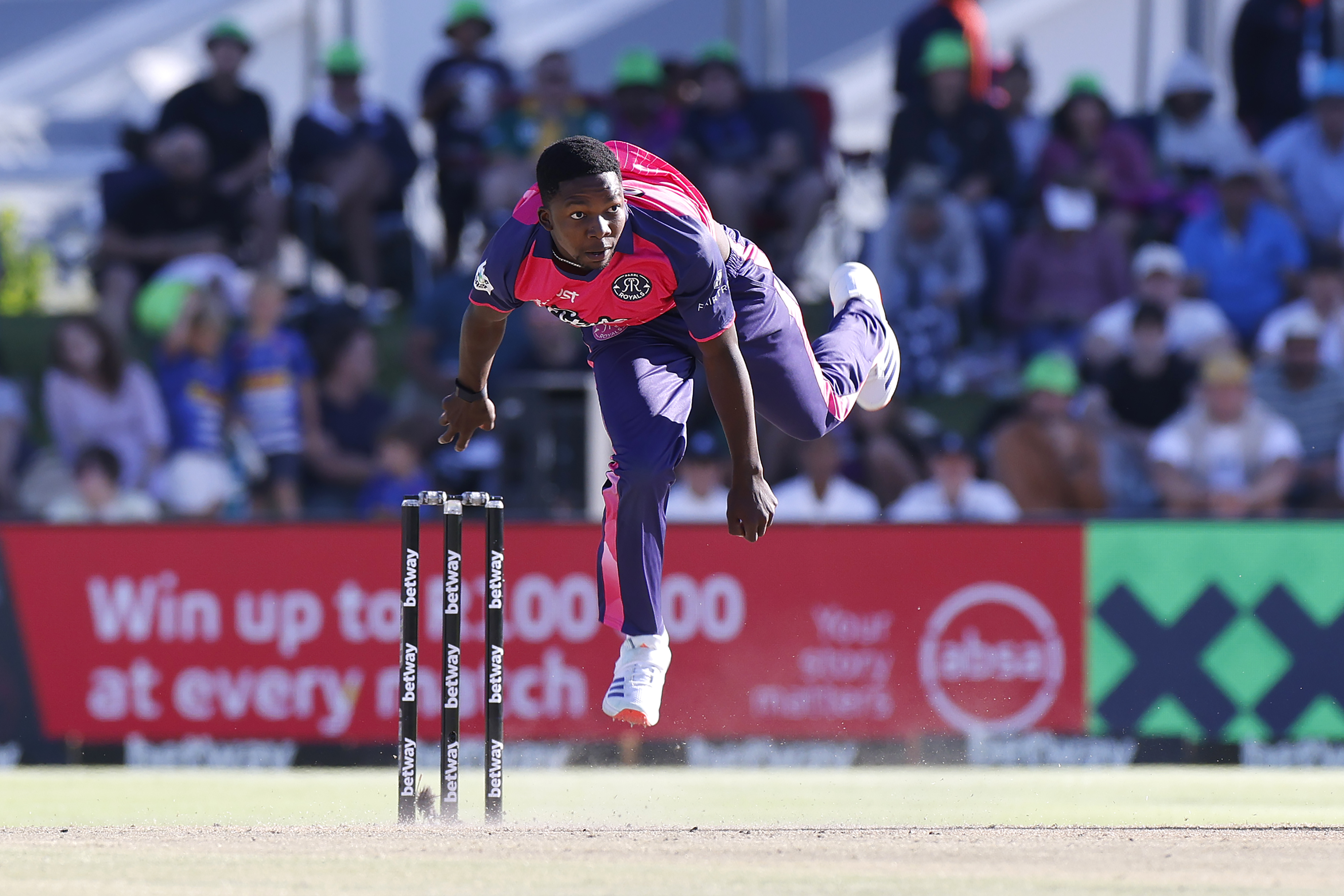The opening two seasons and the start of the third season of the Betway SA20 have been a vital injection into South African cricket.
Stadiums are full across the country, Cricket South Africa’s (CSA) revenue has been given an annual boost (about R30-million) and young, talented players are developing at a faster rate than they would solely playing domestic cricket.
But an Achilles heel of South African cricket has reared its head in the tournament: the lack of black players on the field.
It took until the third match of this season for the first black African players to take to the field when Kwena Maphaka and Lungi Ngidi ran out for the Paarl Royals against the Sunrisers Eastern Cape in a showdown in Paarl.
That means that MI Cape Town, Sunrisers Eastern Cape (twice), Durban’s Super Giants and Pretoria Capitals did not field one black player across the first three days of action.
/file/dailymaverick/wp-content/uploads/2025/01/TL_1973244.jpg)
MI Cape Town has since brought Kagiso Rabada into the playing XI, who was dealing with a niggle initially, while Junior Dala was selected for Durban’s Super Giants’ clash against Pretoria Capitals — which was rained out without a ball being bowled.
Sunrisers Eastern Cape and Joburg Super Kings have not fielded a black South African player yet this season.
And even more damning, across three seasons of SA20 action, the Pretoria Capitals have never fielded a black African player — having none in their squads, which have varied in size from 18-21, since 2023.
In the 2024 season, only 13 black South African players were spread across the six teams, consisting of a total of 119 players. Only six of those played more than one match.
“There was the issue of the number of black players that were signed for season one,” CSA CEO Pholetsi Moseki told Daily Maverick. “It was quite low. It has improved compared to season one, but there’s quite obviously still a lot of work to do.”
Meritocracy
An argument around meritocracy usually unfolds around topics of this nature.
But the process of acquiring players for the respective teams is not as straightforward as the cricketers with the best batting or bowling statistics being allocated to the six teams.
There is an auction system in place, a wildcard, teams trade players with one another between seasons, overseas players are limited to four per playing XI and there is a rookie system involved where each team has to select a “rookie” every season.
A rookie is a South African player aged 22 or under on the day of the auction who has not been contracted to SA20 before.
Nqabayomzi Peter (Paarl Royals) and Andile Simelane (Sunrisers Eastern Cape) were both picked up as rookies in season two of the SA20 last year, and have both since gone on to represent the Proteas at national level in white-ball cricket.
Neither, however, has been able to get on to the park for their respective sides yet this season.
Numbers game
Despite being a majority shareholder, CSA has no say on the makeup of the six SA20 squads.
At domestic level, across formats, in South Africa, teams must comprise six players of colour, three of which must be black on every match day.
The national team, conversely, have no set number of black cricketers or cricketers of colour who need to be selected per match day, but over the course of a season, it needs to average at least six players of colour in which two must be black.
For context on why this all exists, and matters, more than 80% of South Africa’s population is black.
Prior to readmission into international cricket, in 1992, South Africa’s apartheid government only permitted white players in its national team.
Having two South African sides contesting against one another without a single representative from the majority population is sure to raise eyebrows.
/file/dailymaverick/wp-content/uploads/2025/01/IMG_5680.jpg)
The selection of players in the SA20 is completely dependent on who the six Indian franchise owners and the various coaches and their teams decide will suit their side.
To strictly say that there is no political involvement in the player selections in the SA20 would be incorrect, however. Those politics are just not South African.
Pakistani players for example are technically not barred from participating in the SA20, but given the political history between India and Pakistan, no Pakistani players have been purchased either as wildcards or at an auction thus far — similar to how no Pakistani players have played in the Indian Premier League since 2008.
Developing players
Well, where are all the black cricketers in South Africa? Across last season’s CSA T20 Challenge, four out of the top five wicket-takers were black. Leg break bowler Junaid Dawood sat atop the tree.
In order, Maphaka, Mihlali Mpongwana, Andile Simelane and Malusi Siboto were next on the charts.
Outside of Maphaka and Simelane, none of the other players were picked up in the six SA20 sides, including Dawood.
The owners of the SA20 sides evidently don’t rate the standard of the domestic T20 tournament very highly, given that Edward Moore and Rivaldo Moonsamy, who topped the run-scoring charts, are also without a franchise side.
Interestingly, there were no black batters in the top 10 run scorers of the CSA T20 Challenge. Lesiba Ngoepe was the highest-placed at 17th. The lack of quality black batters is a problem CSA has identified and is trying to rectify.
CSA has set its goals on two black African batters being part of the playing XI at the home Cricket World Cup in 2027. In next month’s Champions Trophy squad, skipper Temba Bavuma and opening batter Tony de Zorzi are present, which ticks that box for now.
Nonetheless, CSA has developed a specialised programme for black African batters to accelerate their progress and ensure black batters come through the domestic system — headed up by the Executive of Domestic Cricket, Edward Khoza, and Director of National Teams and High Performance, Enoch Nkwe.
“The black batter programme is a key component, not just for the SA20 but for cricket in South Africa,” Moseki said.“The programme is progressing very well being led by Eddie [Edward Khoza] and Enoch [Nkwe].
“We want to develop more black players and give them more opportunities, but also to support them. Even with the SA ‘A’ squads. There are a number of players that have been identified.
“Hopefully that will impact the team that goes to the T20 World Cup or play in the SA20.”
Sibonelo Makhanya of the Joburg Super Kings is the only black batter in the SA20 this season, but he too hasn’t had a run out for the men in yellow yet in 2025.
CSA has made attempts at making the sport more inclusive, but developing players for the shortest format of the game has proven to be a hurdle that’s a lot higher than in other formats of the game — the Proteas’ management was questioned prior to their departure to the T20 World Cup in June last year in the West Indies and USA after Rabada was the only black player in the 15-player squad. DM
SA20 League Commissioner, Graeme Smith, did not respond to Daily Maverick’s questions by the time of publication.





 Kwena Maphaka of Paarl Royals in action. (Photo: sportzpics.co.za)
Kwena Maphaka of Paarl Royals in action. (Photo: sportzpics.co.za)